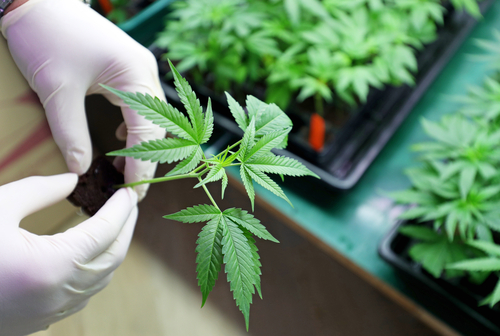DEA Clears Way for MMJ to Import Cannabis Compounds for Trials in Huntington’s Disease and MS

MMJ International Holdings, a pharmaceutical company focused on the development of cannabis-based therapeutic products, will soon begin testing its oral cannabidiol (CBD) and tetrahydrocannabinol (THC) products in U.S. clinical trials for Huntington’s disease and multiple sclerosis.
The U.S. Drug Enforcement Administration (DEA) cleared MMJ to import the compounds from Canada, after the company made the request three months ago.
The cannabis plant produces a variety of compounds known as cannabinoids, including THC and CBD, two of the most abundant found in the plant. CBD, the non-psychoactive component of cannabis, is believed to have neuroprotective properties, while THC is the main psychoactive constituent of cannabis.
These chemicals bind to cannabinoid receptors in the brain, thereby altering the release of chemical messengers that are necessary for nerve cells to communicate.
While cannabinoids have been studied for a variety of neurologic disorders, studies indicate that these compounds may be able to ease Huntington’s disease motor symptoms. Moreover, strong evidence suggests that these cannabinoids can also be useful to treat spasticity and neuropathic pain in multiple sclerosis (MS).
MMJ-001 and MMJ-002 are two of MMJ’s lead therapeutic candidates, and are liquid formulations of highly purified THC and CBD.
The company is developing MMJ-001 to treat spasticity (abnormal muscle tightness) in MS, and MMJ-002 to treat Huntington’s-associated chorea — a neurological condition marked by involuntary spasms or writhing movements.
The U.S. Food and Drug Administration (FDA) granted Orphan Drug Designation to MMJ-002 in January 2019 to advance the candidate’s development as a treatment for Huntington’s.
“We firmly believe that our MMJ natural whole plant derived molecules with a unique combination of pharmacological properties will be FDA approved as a safe and effective prescription drug that can be of great benefit in treating patients with MS and [Huntington’s] diseases,” Duane Boise, CEO of MMJ International Holdings, said in a press release.
“We are pleased with the DEA’s cooperation and support to facilitate our company mission to service the unmet needs of patients suffering from these chronic diseases,” he added.
The DEA had asked MMJ to provide the active pharmaceutical ingredients of its proprietary THC and CBD formulations to be used in clinical trials. Although details of such studies were not mentioned in the release, Tim Moynahan, company chairman, said: “Patients in the MMJ International holdings clinical trials will receive gelatine capsules containing THC and CBD daily.”
A specialty pharmaceutical solutions company will help MMJ with specialized liquid encapsulation solutions, and make sure MMJ follows FDA protocol and DEA manufacturing guidelines.
Currently, several academic institutions are in touch with MMJ to prepare studies of cannabis as a treatment for Huntington’s disease and MS.
“MMJ clinical trials will provide the necessary data to prove that cannabis can treat essential tremors, a neurological disorder that causes involuntary shaking. Ultimately, there’s so much interest in THC and CBD as a treatment modality, so MMJ will be providing the clinical research data necessary to prove patient dosing, safety, and efficacy,” Moynahan stated.
When asked about possible dates for the commercialization of their products, Boise said in a May interview with the Jamaica Observer: “The FDA wants us to be sure the actives are not changing and what the expected shelf life of the medicine will be. Pending any further FDA test, we anticipate 18–24 months before we can commercialize the drug. During that time, we will be conducting our Phase 2 clinical trial.”






